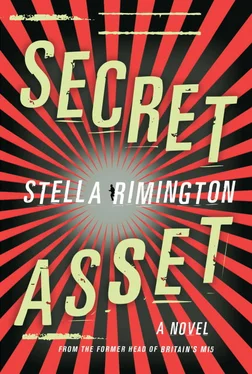Now, as they stood admiring the view from the top of the Sheldonian, Peggy asked Liz, “What did Miss Prideaux mean when she said she was sorry about Ravi?”
Liz shrugged. “I’m not sure. Ravi is Judith Spratt’s husband. His name is Ravi Singh; Judith uses her maiden name at work.”
“I gathered that,” said Peggy. “What does he do?”
“He’s a businessman, from India originally. They’ve been married a long time—I think they met at Oxford. He’s charming.”
“Oh, so you know him?”
“A bit. I’ve been to dinner there a few times.”
Peggy nodded. “It’s difficult, isn’t it? There’s nothing in Judith’s file that says her marital status has changed.”
Liz sighed. She supposed this was the inevitable downside of investigating your colleagues. “We’d better find out for sure then. Hopefully it’s nothing.” But mentally she made a note to talk to B Branch the following day.
Their last interview was in Merton College, which they approached down a narrow alleyway running off the High. The change in tempo from the bustle of a main street to a backwater of almost medieval calm was sudden. As they turned onto the wobbly cobblestones of Merton Street, Liz saw a small churchyard, with a path lined by several magnificent cherry trees. She imagined that this view would not have changed for five hundred years.
His name was Hilary Watts. Professor Watts to me, thought Liz, since he seemed to expect that kind of deference. He was an old-school Arabist with, inevitably, strong Foreign Office connections—he had taught summer school at MECAS, the famous Centre for Arabic Studies in the hills above Beirut, and tutored the more obscure relatives of Jordan’s King Hussein when they came for a final polishing stint to Oxford.
And he had played a long-time role, in the age before open recruitment, as a talent spotter for MI6. He had taught Tom Dartmouth for his postgraduate degree, and been asked for a reference by MI5 when his ex-pupil had applied. The reference, reeking of a past era of old boys’ network and public-school prose, had been three lines long, written on the back of a postcard from the Accademia in Venice: Sound chap. Good languages. More than clever enough for the domestic service.
“Domestic service”—once the prevalent Six view of MI5. Small surprise that Watts had not risen when she and Peggy had knocked on his door, but merely called out a peremptory “Come in.”
Entering, the two women found themselves in a dark room with high ceilings and one vast mullioned window at the far wall, which let very little light in since the curtains—thick velvet but badly in need of cleaning—were half drawn across. The Professor sat in an ancient wing chair, its covers faded to a dull sage. He faced the small slit of undraped window, through which he gazed out at the lush grass of a playing field in Christ Church Meadow.
“Do sit down,” he said, pointing to a long settee that ran at right angles to his chair. Obeying him, they positioned themselves carefully, and Liz examined the man, who continued to look out at the meadow. It was an aged but distinguished face, with a long aquiline nose that was sprinkled with veins, high concave cheekbones, and small darting eyes of vivid blue. He tilted his head onto one shoulder and took them both in. “Ladies,” he said shortly. “How can I be of assistance to you?”
Liz noticed that his hand was holding a pipe, and he lifted it now and made a show of knocking out the bowl. Bits of ash scattered over his thick trousers, and he brushed them away irritably while Liz explained they were there to ask him about Tom Dartmouth.
“Oh Tom,” he said. “Gifted fellow. Came to me for the lingo, though he was already good at it.”
At this he nodded and puffed leisurely at his pipe. Liz asked gently, “Had you known him as an undergraduate?”
Watts detached the stem with palpable reluctance from his lips. “I don’t teach undergraduates,” he said with a shake of his head. “But Mason at Balliol said young Dartmouth took the best First in PPE that year.”
“Was there anything distinctive about Tom? Anything you remember as unusual?”
“All my students are unusual,” he said matter-of-factly.
Peggy looked sideways at Liz. Liz had to admire the self-confidence of this dinosaur; it was so pronounced that it did not even sound boastful.
“I’m sure they are,” acknowledged Liz mildly. “But I wondered if there was anything in particular you remembered about Tom.”
This time Watts seemed happy to take his pipe out. He said sharply, “Only that he was a disappointment.”
Surprised, Liz asked, “Why was that?”
“I thought he had the makings of a very fine Arabist. He could have done a DPhil in no time—these days you’ve got to have one for a university post.”
Was that it? wondered Liz. Watts was cross with Tom because he’d left the land of academe. “Was that very disappointing?”
“What?” demanded Watts, sounding annoyed. “That he didn’t want to teach? No no, it wasn’t that. God knows the world isn’t short of academics.”
He looked slightly miffed, as if recalling some slight, and Liz decided not to press him. Though a large part of her wanted to say to this preposterous relic of an earlier age, “Come out with it. Tell us just how Tom Dartmouth— best First in his year, gifted chap, one of us, etc., etc. —let you, his mentor, down.”
But she didn’t have long to wait. With a show of regret that struck Liz as wholly insincere, Watts said slowly, “I arranged for him to see my friends in London.” For the first time he looked directly at Liz, his eyes opaque, uninterested. “Your counterparts.”
Six, thought Liz. Certainly the obvious place for a high-flying Arabist. “What happened?” she asked, discovering that this veteran of the old school was annoying her as much as she clearly annoyed him. Thank God the shutters have opened, she thought, thinking of the comparatively transparent conduct of the intelligence world these days.
Now Watts took his time responding, as if to teach Liz that she was not really in charge of the interview. Eventually he said, “The boy wasn’t interested. I thought at first that meant he wanted to join the Foreign Office, have a proper diplomatic career. But no, not at all. ‘What is it then?’ I asked him. ‘Money?’ I could understand that—he would earn a fortune helping some bank trying to get established in the Middle East. But no it wasn’t that either.” Watts paused, as if revolted by the memory. When he spoke again it was with his pipe stem half in his mouth, so he was quite literally biting his words. “He told me he wanted to work for you people. On the home front is how he put it to me. Said he wanted to tackle the security threats direct. I asked him if he’d really worked so hard and done so well in order to become some kind of bloody policeman.”
Out of nowhere, Peggy piped up for only the second time that day. “What did Tom say?”
Watts turned and gave Peggy a contemptuous look for her impertinence. Patronising old buffer, thought Liz, he’d have an absolute heart attack if he knew Peggy was from Six.
He spoke now with an angry current to his voice. “He laughed, and said I didn’t understand.” From Watts’s expression, it was clear this was the ultimate sin.
Back in London early that evening, Liz dropped Peggy off and drove straight home. She took an unenthusiastic look at the sparse contents of her fridge and decided she wasn’t feeling hungry. The light on her answering machine was blinking, and reluctantly she went across to play back the messages, hoping that it wasn’t someone from the office. She was tired: what she wanted more than anything else was a deep bath, a large vodka tonic, and bed.
Читать дальше












